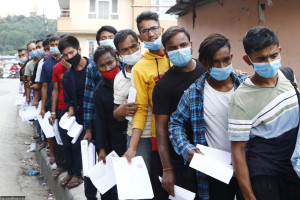Money
Investors boycott trading on Nepse for whole day
Stock investors stepped up their protest by boycotting trading on the Nepal Stock Exchange (Nepse) for the whole day on Tuesday after holding a 30-minute boycott on Monday.
Stock investors stepped up their protest by boycotting trading on the Nepal Stock Exchange (Nepse) for the whole day on Tuesday after holding a 30-minute boycott on Monday.
Traders rose up in arms after the government revised the capital gains tax threshold on the sale of bonus and rights shares. They have threatened to boycott trading for an indefinite period if the government does not withdraw its decision.
Investors picketed the central office of Nepse at Singha Durbar and the offices of a number of brokering companies as part of their protest. Zero shares were traded on the floor of the Nepse on Tuesday. The daily turnover on a normal day reaches Rs400 million. Nepse spokesperson Murahari Parajuli said no shares were traded throughout the country on Tuesday.
Investors launched a protest after the Inland Revenue Department (IRD) last Friday wrote to the Securities Board of Nepal, Nepse and CDS and Clearing instructing them to revise the capital gains tax threshold on bonus and rights shares.
The IRD has asked them to charge capital gains tax as per the Income Tax Act 2002. As per the new directive, investors are required to pay capital gains tax on the sale of rights and bonus shares on the basis of the market value of the company’s shares.
The boycott by brokers resulted in losses worth millions of rupees in revenue to the government. This is the second boycott in two years. In 2016, brokers boycotted trading for a day after the Securities Board of Nepal revised their rate of commission.
Santosh Mainali, general secretary of the Stock Brokers Association of Nepal, said stockbrokers were compelled to stop transactions after investors did not post any purchase or sale orders.
“Although we kept our offices open for work, no investor turned up for share transactions,” said Mainali. He added that small investors might have been reluctant to post orders due to risk of loss with uncertainty hanging over the fate of the government’s new policy.
Finance Ministry officials said they were considering refunding the money collected as capital gains tax if the concerned investors suffer a loss during the year. “The ministry is mulling to charge capital gains tax based on the base rate of Rs100 per unit at the time of the transaction, which will be refunded to the investors if they face loss on average transactions over a year,” a Finance Ministry source said.
Stockbrokers, however, said the proposed tax refund policy would not help small investors and those who conduct transactions irregularly. “These types of investors exist in the market, and they will not benefit even if the government enforce the tax refund system on share transactions,” said a stockbroker who wished to remain unnamed.
Rajan Lamsal, general secretary of the Nepal Investors Forum, said they would boycott share trading for an indefinite period if the government disregarded their plea.
“Our only concern is that tax authorities should not overburden investors if they have incurred a loss. Also, the capital gains tax should be considered as the final tax and not income tax in advance,” Lamsal said.
FinMin forms taskforce
The Finance Ministry on Tuesday formed a taskforce to study the new system of imposing capital gains tax on right shares and bonus shares based on the market value and floor price of Rs100 per unit. The seven-member taskforce led by Finance Joint Secretary Uttar Kumar Khatri includes representatives from the IRD, Department of Revenue Investigation, Securities Board of Nepal, Nepse and CDS and Clearing, and a capital market expert as members.
Revenue Secretary Shishir Kumar Dhungana said the panel had been given 15 days to submit a report. “Based on the study report, the ministry will plan its next move,” Dhungana said.
Meanwhile, the Nepal Chamber of Commerce (NCC) expressed concern at the government’s recent decision to revise the threshold of capital gains tax on rights and bonus shares based on the market price. It demanded that the government revoke the decision.
“The new tax slab is against universally accepted principles and ongoing international practices,” the NCC said in a press release. (PR)




 21.81°C Kathmandu
21.81°C Kathmandu













